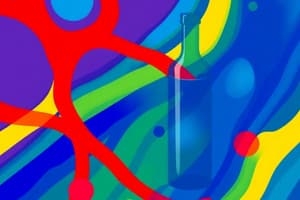Podcast
Questions and Answers
Match the following actions/effects of alcohol with their descriptions:
Match the following actions/effects of alcohol with their descriptions:
Enhancement of GABA effect on GABA receptors = Leads to CNS depression Inhibition of glutamate action on NMDA receptors = Causes disruption in memory, consciousness, alertness Up-regulation of NMDA receptors & voltage sensitive Ca channels = Leads to alcohol tolerance & withdrawal symptoms Myocardial contractility depression = Leads to cardiovascular depression
Match the following symptoms with their corresponding alcohol consumption levels:
Match the following symptoms with their corresponding alcohol consumption levels:
Nystagmus, slurred speech, impaired judgment, ataxia = Mild-moderate amounts Respiratory depression, respiratory acidosis = Severe amounts Sedation, hypnosis, loss of consciousness = Mild-moderate amounts Hypotension, hypothermia, coma, death = Severe amounts
Match the following effects of alcohol on the nervous system with their descriptions:
Match the following effects of alcohol on the nervous system with their descriptions:
Relieves anxiety, euphoria = Mild-moderate amounts CNS depression Severe CNS depression = Severe amounts CNS depression Chronic alcohol consumption = Leads to up-regulation of NMDA receptors & voltage sensitive Ca channels Acute alcohol consumption = Enhances the effect of GABA on its receptors in brain
Match the following cardiovascular effects of alcohol with their descriptions:
Match the following cardiovascular effects of alcohol with their descriptions:
Match the following chronic alcohol effects with their descriptions:
Match the following chronic alcohol effects with their descriptions:
Flashcards are hidden until you start studying
Study Notes
Actions/Effects of Alcohol
- Inhibits impulsivity and judgment, leading to impaired decision-making
- Disrupts communication between brain cells, causing impaired coordination and balance
- Enhances the effects of GABA (inhibitory neurotransmitter), leading to relaxation and sedation
Symptoms of Alcohol Consumption
- Slurred speech and impaired motor skills ( Blood Alcohol Content (BAC) > 0.08%)
- Drowsiness, confusion, and decreased response to stimuli (BAC > 0.15%)
- Loss of consciousness and suppressed breathing (BAC > 0.30%)
Effects of Alcohol on the Nervous System
- Depresses the central nervous system, slowing down neural activity
- Impairs cognitive function, memory, and learning
- Interferes with the brain's reward system, leading to addiction
Cardiovascular Effects of Alcohol
- Low to moderate consumption (1-2 drinks/day) reduces cardiovascular disease risk
- High consumption (>3 drinks/day) increases blood pressure, heart rate, and cardiovascular disease risk
- Binge drinking increases risk of cardiac arrhythmias and sudden death
Chronic Effects of Alcohol
- Liver damage and cirrhosis due to chronic heavy drinking
- Increased risk of certain cancers, such as liver, breast, and colon cancer
- Nutritional deficiencies, particularly thiamine deficiency (Wernicke-Korsakoff syndrome)
Studying That Suits You
Use AI to generate personalized quizzes and flashcards to suit your learning preferences.




